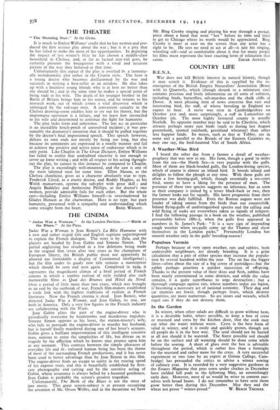THE THEATRE
" The Morning Star." At the Globe.
It is much to Emlyn Williams' credit that he has written and pro- duced the first serious play about the war ; but it is a pity that he has failed to make the most of his opportunities. In depicting the impact of last winter's blitz he has chosen a middle-class household in Chelsea, and, as far as factual mat trial goes, he certainly presents the bourgeoisie with a vivid and accurate picture of the way they behaved at that time.
Unfortunately this aspect of the play is overlaid bl a fantastic- ally melodramatic plot rather in the Cronin style. The hero is a young doctor who becomes disillusioned by the war and succeeds in writing a best-seller as an antidote. He also takes up with a brainless young blonde who is at best no better than she should be ; and at the same time he makes a special point of being rude to his wife. The death of his younger brother in the Battle of Britain brings him to his senses, and he returns to his research work, out of which comes a vital discovery which is sabotaged by the red-tape men. A convenient casualty in the Chelsea drawing-room enables him to try out his theory, but the impromptu operation is a failure, and we leave him reconciled to his wife and determined to continue the fight for humanity.
The play lacks form and coherence. The last act in particular is an incredible hotch-potch of unresolved incident; it was pre- sumably the dramatist's intention that it should be pulled together by the doctor's final impassioned speech. This speech. however, defeats its own ends not merely by being too long, but also because its sentiments are expressed in a woolly manner and fail to achieve the positive and active sense of endeavour which is its only point. Like Chaplin in The Great Dictator, Emlyn Williams has failed to realise that undoubted sincerity is not enough to cover up loose writing ; and with all respect to his acting tlyough- out the play, he cannot in this instance be compared to Chaplin.
The play is exceedingly well-mounted, and the cast is one of the most talented seen for some time. Elliot Mason, as the Chelsea chatelaine, gives us a character absolutely true to type. Frederick Lloyd, as a crusty doctor, and Roddy Hughes, as his Welsh manservant, operate the sub-plot with great skill ; and Angela Baddeley and Ambrosine Phillips, as the doctor's two women, provide admirable foils for each other. But the whole cast—including Emlyn Williams himself—is overshadowed by Gladys Henson as the charwoman. Here is no type, but pure humanity, presented with a sympathy and understanding which






















 Previous page
Previous page